新概念英语2-知识点全学习资料
- 格式:doc
- 大小:1.10 MB
- 文档页数:247
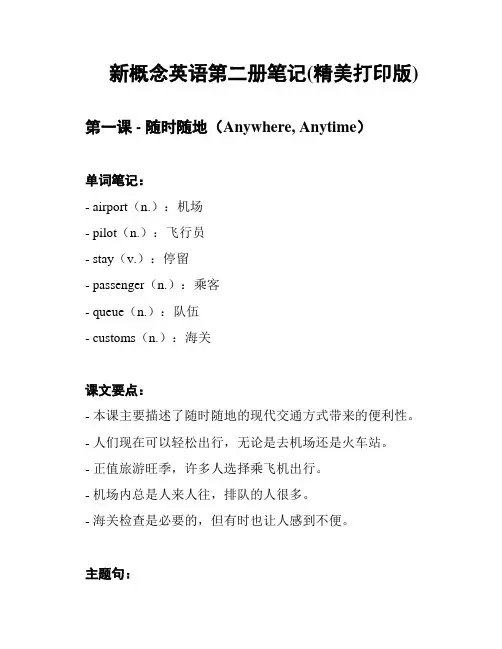
新概念英语第二册笔记(精美打印版)第一课 - 随时随地(Anywhere, Anytime)单词笔记:- airport(n.):机场- pilot(n.):飞行员- stay(v.):停留- passenger(n.):乘客- queue(n.):队伍- customs(n.):海关课文要点:- 本课主要描述了随时随地的现代交通方式带来的便利性。
- 人们现在可以轻松出行,无论是去机场还是火车站。
- 正值旅游旺季,许多人选择乘飞机出行。
- 机场内总是人来人往,排队的人很多。
- 海关检查是必要的,但有时也让人感到不便。
主题句:现代交通方式的进步使我们能够随时随地旅行。
语法重点:- 本课中出现了一些现在进行时的句子,如:People are going to airports and railway stations.(人们正前往机场和火车站。
)- 该课还涉及到一些定冠词的用法,如:I like the customs officer.(我喜欢海关工作人员。
)- 其他值得注意的语法点包括人称代词的宾格形式、形容词比较级等。
第二课 - 奇怪的事(Something Strange)单词笔记:- strange(adj.):奇怪的- fly(v.):飞- cloud(n.):云- monster(n.):怪物- little(adj.):小的- eat(v.):吃- bird(n.):鸟课文要点:- 本课主要讲述了一个小男孩和他的奇怪经历。
- 有一天,男孩看到了一只怪物,它是一个身穿红色衣服、长着绿色头发和眼睛的生物。
- 怪物告诉男孩,他不会飞,但是他能飞到云中间。
- 然后,怪物吃了一些小鸟。
- 最后,怪物告诉男孩他会在树上等待,然后就飞走了。
主题句:男孩看到了一个奇怪的怪物,并与它进行了交谈。
语法重点:- 这篇课文中包含了一些过去式的动词,如:He ate five small birds.(他吃了五只小鸟。
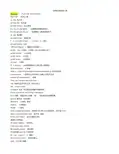
新概念英语第二册A private conversationadj.私人的①adj. 私人的private life 私生活private school 私立学校It's my private letter. (如果妈妈想看你的信)It's my private house. (如果陌生人想进你的房子)②adj. 普通的private citizen 普通公民I’m a private citizen. (citizen n. 公民)private soldier 大兵《Private Ryan》(《拯救大兵瑞恩》)public adj. 公众的,公开的(private的反义词)public school 公立学校public letter 公开信public place 公共场所privacy n.隐私It’s privacy. 这是我的隐私!(不愿让别人知道的)★conversation n.谈话have a + talk/chat/dialogue/conversation/gossip 名词变动词conversation 一般用于正式文体中, 内容上往往不正式subject of conversation 话题They are having a conversation.talk 内容可正式可不正式, 也可以私人Let’s have a talk.dialogue 对话, 可以指正式国家与国家会谈China and Korea are having a dialogue.chat 闲聊,就是北京人说的“侃”,说的是无关紧要的事。
gossip 嚼舌头, 说长道短★theatre n.剧场, 戏剧cinema n.电影院★seat n.座位have a good seat/place,这里的seat指place(指地点),而不是chair. take a seat/take your seat 坐下来, 就坐Is the seat taken? 这个位置有人吗?请坐的3种说法:Sit down, please. (命令性)Take your seat, please.Be seated, please. (更礼貌)作为动词的seat与sit的区别sit(sat,sitten)vi. 就座He is sitting there. 他坐在那儿。
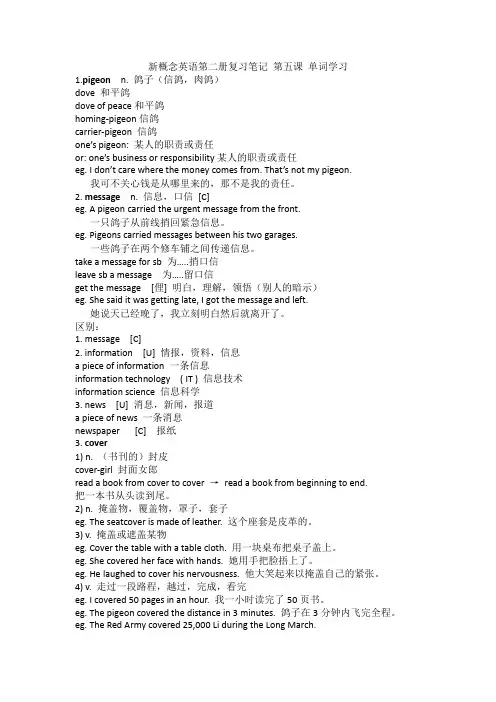
新概念英语第二册复习笔记第五课单词学习1.pigeon n. 鸽子(信鸽,肉鸽)dove 和平鸽dove of peace和平鸽homing-pigeon信鸽carrier-pigeon 信鸽one’s pigeon: 某人的职责或责任or: one’s business or responsibility某人的职责或责任eg. I don’t care where the money comes from. That’s not my pigeon.我可不关心钱是从哪里来的,那不是我的责任。
2. message n. 信息,口信[C]eg. A pigeon carried the urgent message from the front.一只鸽子从前线捎回紧急信息。
eg. Pigeons carried messages between his two garages.一些鸽子在两个修车铺之间传递信息。
take a message for sb 为…..捎口信leave sb a message 为…..留口信get the message [俚] 明白,理解,领悟(别人的暗示)eg. She said it was getting late, I got the message and left.她说天已经晚了,我立刻明白然后就离开了。
区别:1. message [C]2. information [U] 情报,资料,信息a piece of information 一条信息information technology ( IT ) 信息技术information science 信息科学3. news [U] 消息,新闻,报道a piece of news 一条消息newspaper [C] 报纸3. cover1) n. (书刊的)封皮cover-girl 封面女郎read a book from cover to cover →read a book from beginning to end.把一本书从头读到尾。
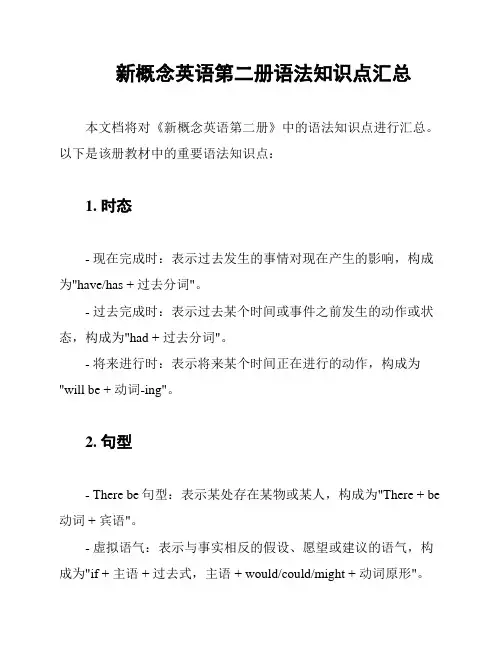
新概念英语第二册语法知识点汇总本文档将对《新概念英语第二册》中的语法知识点进行汇总。
以下是该册教材中的重要语法知识点:1. 时态- 现在完成时:表示过去发生的事情对现在产生的影响,构成为"have/has + 过去分词"。
- 过去完成时:表示过去某个时间或事件之前发生的动作或状态,构成为"had + 过去分词"。
- 将来进行时:表示将来某个时间正在进行的动作,构成为"will be + 动词-ing"。
2. 句型- There be句型:表示某处存在某物或某人,构成为"There + be 动词 + 宾语"。
- 虚拟语气:表示与事实相反的假设、愿望或建议的语气,构成为"if + 主语 + 过去式,主语 + would/could/might + 动词原形"。
3. 名词- 可数名词与不可数名词:可数名词可以同时使用单复数形式,而不可数名词只能使用单数形式。
- 复合名词:由两个或更多个词构成的名词,如"homework"、"football"等。
4. 冠词- 定冠词:表示特指的冠词,如"the"。
- 不定冠词:表示泛指的冠词,如"a/an"。
5. 代词- 主格代词:在句子中作主语,如"I"、"you"等。
- 宾格代词:在句子中作宾语,如"me"、"you"等。
- 物主代词:表示所属关系的代词,如"my"、"your"等。
6. 动词- 不定式:表示动作的动词原形,可以作主语、宾语等,如"to eat"。
- 动词的时态变化:根据不同的时态,在动词前加不同的助动词,如"is/am/are"表示现在进行时。
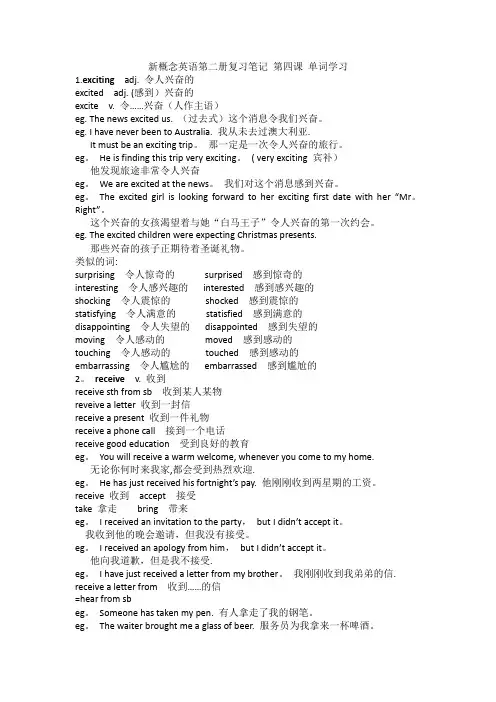
新概念英语第二册复习笔记第四课单词学习1.exciting adj. 令人兴奋的excited adj. (感到)兴奋的excite v. 令……兴奋(人作主语)eg. The news excited us. (过去式)这个消息令我们兴奋。
eg. I have never been to Australia. 我从未去过澳大利亚.It must be an exciting trip。
那一定是一次令人兴奋的旅行。
eg。
He is finding this trip very exciting。
( very exciting 宾补)他发现旅途非常令人兴奋eg。
We are excited at the news。
我们对这个消息感到兴奋。
eg。
The excited girl is looking forward to her exciting first date with her “Mr。
Right”。
这个兴奋的女孩渴望着与她“白马王子”令人兴奋的第一次约会。
eg. The excited children were expecting Christmas presents.那些兴奋的孩子正期待着圣诞礼物。
类似的词:surprising 令人惊奇的surprised 感到惊奇的interesting 令人感兴趣的interested 感到感兴趣的shocking 令人震惊的shocked 感到震惊的statisfying 令人满意的statisfied 感到满意的disappointing 令人失望的disappointed 感到失望的moving 令人感动的moved 感到感动的touching 令人感动的touched 感到感动的embarrassing 令人尴尬的embarrassed 感到尴尬的2。
receive v. 收到receive sth from sb 收到某人某物reveive a letter 收到一封信receive a present 收到一件礼物receive a phone call 接到一个电话receive good education 受到良好的教育eg。
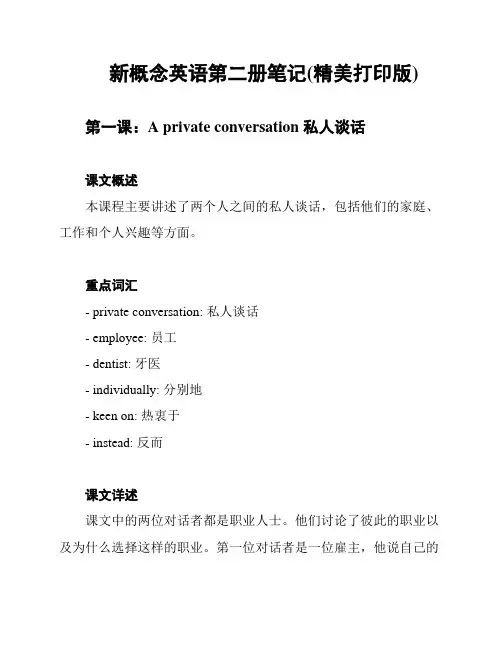
新概念英语第二册笔记(精美打印版)第一课:A private conversation 私人谈话课文概述本课程主要讲述了两个人之间的私人谈话,包括他们的家庭、工作和个人兴趣等方面。
重点词汇- private conversation: 私人谈话- employee: 员工- dentist: 牙医- individually: 分别地- keen on: 热衷于- instead: 反而课文详述课文中的两位对话者都是职业人士。
他们讨论了彼此的职业以及为什么选择这样的职业。
第一位对话者是一位雇主,他说自己的员工做事不利索,需要手把手地指导。
他所雇佣的人中,有一位牙医,这位牙医个人能力很强,但做事不守规矩。
第二位对话者是一位操控电视卫星的技术员,他对自己的工作很满意。
他认为这份工作能提供稳定的收入,而且他对这个技术很感兴趣。
相比之下,他并不喜欢在办公室工作。
他坚信个人的兴趣和爱好应该引导自己的职业选择,而不仅仅是为了赚钱。
在谈论个人爱好时,两位对话者发现他们都对音乐很感兴趣。
然而,他们的爱好有所不同。
第一位对话者表示,他喜欢个别的音乐会,而不是大型音乐会。
第二位对话者则喜欢大型音乐会,认为那种氛围和观众的热情是独一无二的。
课后练1. 为什么第一位对话者对自己的员工感到不满意?2. 第二位对话者为什么喜欢做电视卫星的技术员?3. 两位对话者的音乐兴趣有何不同?参考答案1. 第一位对话者对自己员工感到不满意是因为他们做事情不利索,需要手把手地指导。
2. 第二位对话者喜欢做电视卫星的技术员是因为这份工作能提供稳定的收入,而且他对这个技术很感兴趣。
3. 两位对话者的音乐兴趣不同。
第一位对话者喜欢个别的音乐会,而第二位对话者喜欢大型音乐会。
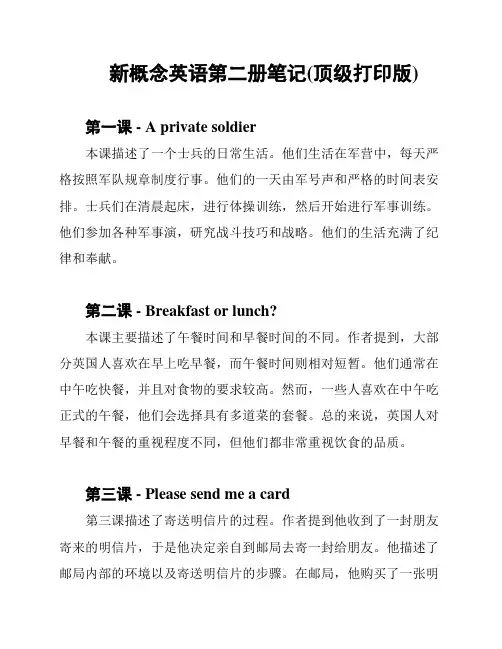
新概念英语第二册笔记(顶级打印版)第一课 - A private soldier本课描述了一个士兵的日常生活。
他们生活在军营中,每天严格按照军队规章制度行事。
他们的一天由军号声和严格的时间表安排。
士兵们在清晨起床,进行体操训练,然后开始进行军事训练。
他们参加各种军事演,研究战斗技巧和战略。
他们的生活充满了纪律和奉献。
第二课 - Breakfast or lunch?本课主要描述了午餐时间和早餐时间的不同。
作者提到,大部分英国人喜欢在早上吃早餐,而午餐时间则相对短暂。
他们通常在中午吃快餐,并且对食物的要求较高。
然而,一些人喜欢在中午吃正式的午餐,他们会选择具有多道菜的套餐。
总的来说,英国人对早餐和午餐的重视程度不同,但他们都非常重视饮食的品质。
第三课 - Please send me a card第三课描述了寄送明信片的过程。
作者提到他收到了一封朋友寄来的明信片,于是他决定亲自到邮局去寄一封给朋友。
他描述了邮局内部的环境以及寄送明信片的步骤。
在邮局,他购买了一张明信片,写下了一些祝福的话语,并将明信片投入邮箱。
通过这个故事,我们可以了解到寄信的简单过程以及邮局的服务。
第四课 - An exciting trip本课描述了作者在乘坐飞机的旅行中的经历。
他搭乘飞机前往某个异国他乡。
他说他对飞行感到非常兴奋,飞机从地面升起,他逐渐能看到云朵和地球的景色。
作者感受到飞行的愉悦和独特之处。
尽管飞行中存在些许颠簸,但作者还是对这次旅行的刺激和兴奋充满期待。
第五课 - She's got a bike本课描述了一个女孩拥有自行车的故事。
女孩对自行车非常珍惜,并且乐于与别人分享。
她会骑着自行车到处游玩,与朋友一起度过美好的时光。
女孩非常喜欢自行车,她将它视为一种自由的方式。
做父母的则非常认同自行车的积极影响,并且对女孩骑行的能力感到骄傲。
第六课 - What's in your hand?本课描述了一个妇女在手中拿着一个刚刚购买的物品。
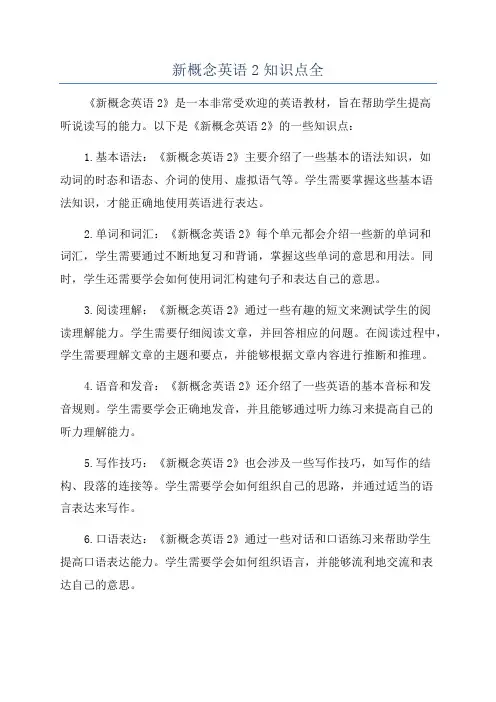
新概念英语2知识点全《新概念英语2》是一本非常受欢迎的英语教材,旨在帮助学生提高听说读写的能力。
以下是《新概念英语2》的一些知识点:1.基本语法:《新概念英语2》主要介绍了一些基本的语法知识,如动词的时态和语态、介词的使用、虚拟语气等。
学生需要掌握这些基本语法知识,才能正确地使用英语进行表达。
2.单词和词汇:《新概念英语2》每个单元都会介绍一些新的单词和词汇,学生需要通过不断地复习和背诵,掌握这些单词的意思和用法。
同时,学生还需要学会如何使用词汇构建句子和表达自己的意思。
3.阅读理解:《新概念英语2》通过一些有趣的短文来测试学生的阅读理解能力。
学生需要仔细阅读文章,并回答相应的问题。
在阅读过程中,学生需要理解文章的主题和要点,并能够根据文章内容进行推断和推理。
4.语音和发音:《新概念英语2》还介绍了一些英语的基本音标和发音规则。
学生需要学会正确地发音,并且能够通过听力练习来提高自己的听力理解能力。
5.写作技巧:《新概念英语2》也会涉及一些写作技巧,如写作的结构、段落的连接等。
学生需要学会如何组织自己的思路,并通过适当的语言表达来写作。
6.口语表达:《新概念英语2》通过一些对话和口语练习来帮助学生提高口语表达能力。
学生需要学会如何组织语言,并能够流利地交流和表达自己的意思。
7.文化背景:《新概念英语2》还会介绍一些英语国家的文化背景和习俗。
通过了解不同的文化背景,学生可以更好地理解和运用所学的英语知识。
以上是《新概念英语2》的一些主要知识点,通过学习这些知识点,学生可以提高听说读写的各项能力。
但是,单纯地掌握这些知识点还不够,学生需要通过不断地练习和实践,才能真正地运用这些知识点来进行有效的英语交流。
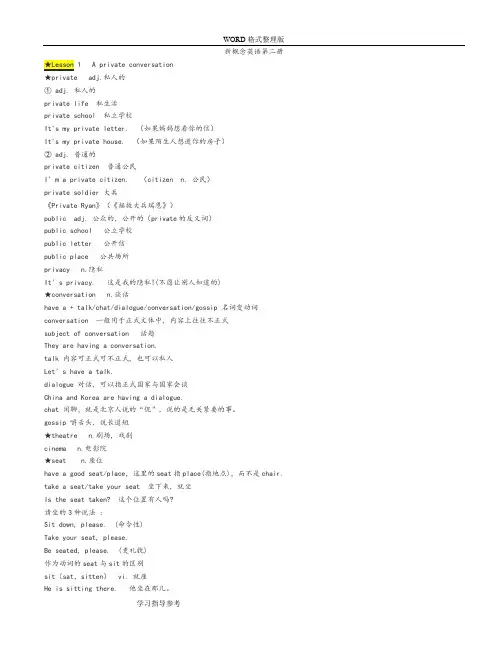
新概念英语第二册★private adj.私人的① adj. 私人的private life 私生活private school 私立学校It's my private letter. (如果妈妈想看你的信)It's my private house. (如果陌生人想进你的房子)② adj. 普通的private citizen 普通公民I’m a private citizen. (citizen n. 公民)private soldier 大兵《Private Ryan》(《拯救大兵瑞恩》)public adj. 公众的,公开的(private的反义词)public school 公立学校public letter 公开信public place 公共场所privacy n.隐私It’s privacy. 这是我的隐私!(不愿让别人知道的)★conversation n.谈话have a + talk/chat/dialogue/conversation/gossip 名词变动词conversation 一般用于正式文体中, 内容上往往不正式subject of conversation 话题They are having a conversation.talk 内容可正式可不正式, 也可以私人Let’s have a talk.dialogue 对话, 可以指正式国家与国家会谈China and Korea are having a dialogue.chat 闲聊,就是北京人说的“侃”,说的是无关紧要的事。
gossip 嚼舌头, 说长道短★theatre n.剧场, 戏剧cinema n.电影院★seat n.座位have a good seat/place,这里的seat指place(指地点),而不是chair. take a seat/take your seat 坐下来, 就坐Is the seat taken? 这个位置有人吗?请坐的3种说法 :Sit down, please. (命令性)Take your seat, please.Be seated, please. (更礼貌)作为动词的seat与sit的区别sit(sat,sitten) vi. 就座He is sitting there. 他坐在那儿。
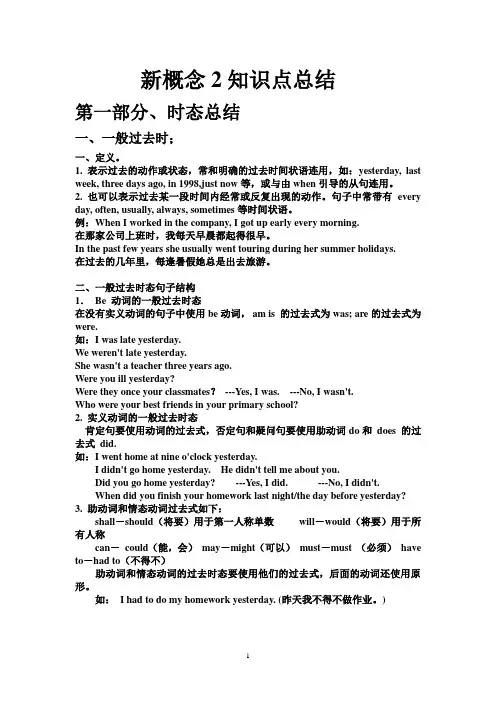
新概念2知识点总结第一部分、时态总结一、一般过去时;一、定义。
1. 表示过去的动作或状态,常和明确的过去时间状语连用,如:yesterday, last week, three days ago, in 1998,just now等,或与由when引导的从句连用。
2. 也可以表示过去某一段时间内经常或反复出现的动作。
句子中常带有every day, often, usually, always, sometimes等时间状语。
例:When I worked in the company, I got up early every morning.在那家公司上班时,我每天早晨都起得很早。
In the past few years she usually went touring during her summer holidays.在过去的几年里,每逢暑假她总是出去旅游。
二、一般过去时态句子结构1.Be 动词的一般过去时态在没有实义动词的句子中使用be动词,am is 的过去式为was; are的过去式为were.如:I was late yesterday.We weren't late yesterday.She wasn't a teacher three years ago.Were you ill yesterday?Were they once your classmates?---Yes, I was. ---No, I wasn't.Who were your best friends in your primary school?2. 实义动词的一般过去时态肯定句要使用动词的过去式,否定句和疑问句要使用助动词do和does 的过去式did.如:I went home at nine o'clock yesterday.I didn't go home yesterday. He didn't tell me about you.Did you go home yesterday?---Yes, I did. ---No, I didn't.When did you finish your homework last night/the day before yesterday? 3. 助动词和情态动词过去式如下:shall―should(将要)用于第一人称单数will―would(将要)用于所有人称can―could(能,会)may―might(可以)must―must (必须)have to―had to(不得不)助动词和情态动词的过去时态要使用他们的过去式,后面的动词还使用原形。
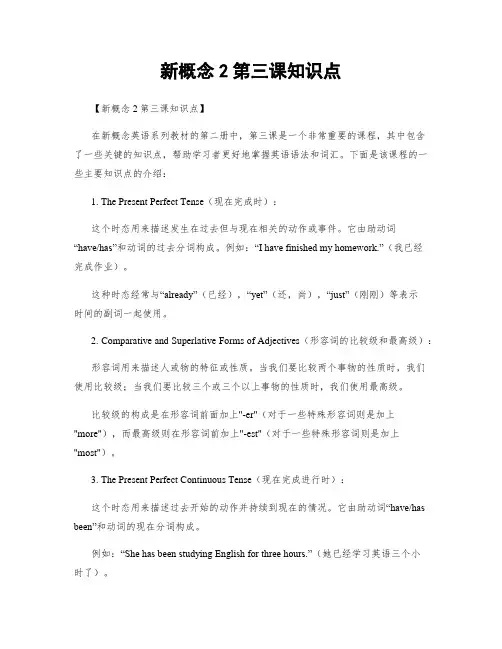
新概念2第三课知识点【新概念2第三课知识点】在新概念英语系列教材的第二册中,第三课是一个非常重要的课程,其中包含了一些关键的知识点,帮助学习者更好地掌握英语语法和词汇。
下面是该课程的一些主要知识点的介绍:1. The Present Perfect Tense(现在完成时):这个时态用来描述发生在过去但与现在相关的动作或事件。
它由助动词“have/has”和动词的过去分词构成。
例如:“I have finished my homework.”(我已经完成作业)。
这种时态经常与“already”(已经),“yet”(还,尚),“just”(刚刚)等表示时间的副词一起使用。
2. Comparative and Superlative Forms of Adjectives(形容词的比较级和最高级):形容词用来描述人或物的特征或性质。
当我们要比较两个事物的性质时,我们使用比较级;当我们要比较三个或三个以上事物的性质时,我们使用最高级。
比较级的构成是在形容词前面加上"-er"(对于一些特殊形容词则是加上"more"),而最高级则在形容词前加上"-est"(对于一些特殊形容词则是加上"most")。
3. The Present Perfect Continuous Tense(现在完成进行时):这个时态用来描述过去开始的动作并持续到现在的情况。
它由助动词“have/has been”和动词的现在分词构成。
例如:“She has been studying English for three hours.”(她已经学习英语三个小时了)。
这个时态通常与表示时间段的短语一起使用,比如“for three hours”(三个小时)或“since last night”(从昨晚开始)。
4. Prepositions of Time(表示时间的介词):介词用来在句子中表达时间、位置或方向等关系。
Lesson 3 Please send me a card1.send v. 发送,寄(sent-sent)Please send me a card=Please send a card to me复习:v.+双宾语give sb sth=give sth to sbshow sb sth =show sth to sbsend sb sth=send sth to sbtell sb sth=tell sth to sbbuy sb sth =buy sth for sbborrow sb sth=borrow sth from sblend sb sth= lend sth to sbbring sb sth=bring sth to sbpass sb sth=pass sth to sbteach sb sth=teach sth to sb……注意:①其中sb叫做间接宾语,sth叫做直接宾语②注意介词的不同搭配:send an email 发送一封电子邮件send for sb 派人去请send up 发射,射出,往上送send out 派遣,发出(信号、通知等)练习:①He was ill, and I thought I should send for a doctor.①The rocket will be sent up tomorrow morning.①People are used to send an email to communication in foreign company.①The crew(机组人员)did not send out any distress signals.(求救信号)2.postcard n.明信片(本课文中的postcard=card)联想:ID card=Identification card 身份证birthday card 生日贺卡credit card 信用卡3.spoil v.使索然无味,损坏,宠坏(spoiled/spoilt-spoiled/spoilt)spoiled adj. 被宠坏的注意:在英文中,现在分词(v-ing)和过去分词(done)可以作adj.修饰名词例:an interesting book一本有趣的书boiled water开水运用:Heavy rain has spoiled/spoilt my holiday.(动词过去分词)That spoiled boy always asks for everything.(过去分词作形容词)辨析:表示“损坏”的单词spoil damage destroy breakspoil 表示破坏心情,宠坏damage 强调损害后还可以修复destroy 强调损坏之后不能修复,彻底破坏break 强调“打破,打碎”练习:①After the air crash, the plane has been destroyed .①One of the visitors damaged our piano, and my dad would have it repaired.①Much homework will spoil my weekend.①Don’t break the vase.4.museum n.博物馆搭配:science museum 科学博物馆art museum 艺术博物馆history museum 历史博物馆5.friendly adj. 友好的;友善的联想:unfriendly 不友好的;不友善的friend 朋友friendship友谊运用:A friendly waiter taught me a few words of Italian.复习:n.+ly →adj.day→daily 日常的week→weekly 每周的year→yearly 每年的6.waiter n.服务员,招待员联想:waitress n.女服务员actor n.男演员/actress n.女演员host n.男主人,男主持人/hostess n.女主人,女主持人7.lend v.借给,借出(lent-lent)搭配:lend sb sth=lend sth to sb运用:He lent me a book.= He lent a book me .辨析:lend和borrowlend 表示借出去,句式是lend sb sth = lend sth to sbborrow 表示借进来,借入,句式是borrow sb sth=borrow sth from sb运用:He wanted to borrow money from me, but I didn’t lend it to him. (他想借钱,但是我没借给他)8.decision n.决定搭配:make a decision to do sth决定做某事例句:I make a decision to study hard. 我下定决心努力学习词根:decide v.决定(decided-decided)decide to do sth决定做某事例句:He decided to give me a hand.拓展:make up one’s mind to do sth.例句:Mr. Wang made up his mind to give up smoking.9.whole adj. 整个的搭配:the whole day=all the day=all day 一整天运用:the whole world 整个世界同音词:hole 洞,孔例句:He fell down the hole with carelessness.运用:dig a hole 挖洞10.single adj.唯一的,单一的,单身的搭配:single room 单人房联想:double adj.双的double room 双人房married adj. 已婚的运用:Are you single or married?I did nor even write a single card.我甚至一张卡片都没有写出来11.line n. 行,也可以表示路线,队列例句:I am repairing your telephone line. 我在修理你的电话线.The line is busy. 线路很忙Stand in the line. 排队12.a few, few, a little, little的用法①a few / few 后+ 可数名词a few 表示“有几个”,表达肯定含义few 表示“几乎没有”,表达否定含义(相当于no)②a little / little 后+ 不可数名词a little 表示“少量”,表达肯定含义little表示“几乎没有”,表达否定含义(相当于no)练习:① There are a few books in the box, and I will take out one to read.① The milk smells spoiled, and I will go to the market to buy a little .① There is a little/little water in the bottles.13.think v. 思考,考虑(thought-thought)think of vs think aboutthink of 想到,考虑,侧重于想起来,记起来think about 考虑,思索,侧重于认真思考,思索练习:①Think about it before you give your idea.①I know that guy, but I just can’t think of his name.14.on the last day 在最后一天on the first day 在第一天具体某一天用介词on练习:① in spring① on a cool autumn night① at noon/night① in June, 2004① on 1st June, 2024① on holiday15.spend v.(spent-spent)花费,度过搭配:spend sth 花费……(spend money 花钱)spend time/money on sthspend time/money (in) doing sth练习:He spends half an hour on English each day.He spends half an hour (in) learning (learn) English each day.16.时态复习:一般过去时一、定义:一般过去时用来表示过去某一时间内发生的动作或存在的状态以及过去习惯性、反复性的动作二、动词构成:was/were 或者动词过去式※注意:复习背诵动词过去式不规则变化表三、句型转换1.be动词的变化肯定句:主语+was/were+其他否定句:主语+was/were+not+其他+?一般疑问句:Was/Were+主语+其他+?特殊疑问句:特殊疑问词+was/were+主语+其他+?2.行为动词的变化肯定句:主语+动词过去式+其他否定句:主语+didn’t+动词原型+其他一般疑问句:Did+主语+动词原型+其他+?特殊疑问句:特殊疑问词+did+主语+动词原型+其他+?四、连用的时间状语yesterday, the day before yesterday, last+时间,时间+ago, just now, in 1990, at the age of ...,When I was 8...,this morning, that day, in those days等。
新概念英语第二册Lesson1知识点1,简单陈述句的语序.时间→主语(人物,物体)→动作→宾语(任务,物体)→HOW→地点→时间如:The children played games quietly in their room yesterday.2,hear和listen的区别,hear强调结果,lister强调动作.如:A:Listen to me. B:Speakup.I can't hear you.3,look,see和watch的区别,look是强调看的动作。
例:look!it is a bird. see是强调看的结果,强调的看得见看不见。
例:i can see a bird. Watch 是比较专心,留意,仔细的看,观察,注视.4,go to the theatre去看戏关于go似乎有很多短语都需要引申的理解,比如go to school上学go to bed 上床,睡觉go to church上教堂,去做礼拜,去以上那些地方都是为了去做事(to),而回家则就是为了休息了,所以也就没有(to)了,直接go home了5,had a very good seat 有个好座位,而不是说座位是金子做的,还镶嵌着<泰坦尼克号>上面那个海洋之心,很值钱,very expensive,而是说位置很好,关键就是不知道这个位置好是因为对于观看电影来说,还是对于观看美女来说,就本人对于课文的理解来说好象是观看美女,一看做美女前面挺高兴,结果美女一边还有个野兽一样的man,而且两人关系密切,不由的作者angry.6,I got very angry我非常生气,get在这里是逐渐变得怎么怎么样,比如我们工作到发工资的时候发现没有奖金了,随后发现没有值班费了,接着又发现很大一部分交税了,最后更发现让老婆支走了,我们就一定会get very sad7,none of your business不关你的事看起来最后狼子野心,昭然若揭了,作者被那个勇敢的男人戳穿了真面目,跟这个女人聊天none of your business,it's my business.复述课文(改动版):Last week I went to the theatre.I had a very good seat.A pretty girl were sitting behind me.I was very happy.I enjoyed she.But a young man sat beside her.They were talking loudly.I got very angry.I turned round.But the girl did not pay any attention to me.In the end,I could not bear it.I turned round again."Can you chat with me,too?"I said rudely."It's none of your business."The young man said angrily."This is my wife."Then I went to the hospital for my wound.新概念英语第二册Lesson2知识点1.It was Sunday. 那是个星期天。
新概念第二册一般现在时1. 用法:①表示经常性的动作或习惯性的动作,常与表示频率的时间状语连用例:Mrs. Sawyer stays at home every day.②表示主语具备的性格、能力、特征例:He is a careless boy. 他是一个粗心的男孩。
③表示一种状态例:There is a picture of his dog on the wall. 墙上挂着一张他狗狗的照片。
④表示客观事实和普遍真理例:The earth moves around the sun. 地球围着太阳转。
2. 标志词:频率副词(always; usually; often; sometimes; rarely; never)every… 每个…; once… …一次; twice… …两次; …times …几次in the morning / afternoon / evening; at noon / night; on Sundays3. 构成:①当句中动词为Be动词时:肯定句:主语+ Be动词(am / is / are)+ 其它否定句:主语+ Be not(am not / isn’t / aren’t)+ 其它一般疑问句:Be动词(am / is / are)+ 主语+ 其它?②当句中动词为情态动词时:肯定句:主语+ 情态动词+ 其它否定句:主语+ 情态动词+ not + 其它一般疑问句:情态动词+ 主语+ 其它?③当句中动词为实义动词时:肯定句:主语+ 实义动词+ 其它否定句:主语+ don’t / doesn’t + 实义动词原形+ 其它一般疑问句:Do / Does + 主语+ 实义动词原形+ 其它?●特别注意:一般现在时,当主语为第三人称单数时,实义动词变其三单形式。
do和does为一般现在时的助动词,在否定句及疑问句中辅助实义动词使用,当句中有助动词do和does时,实义动词变原形(吸星大法/ 照妖镜)。
新概念英语第二册私人的① adj. 私人的private life 私生活private school 私立学校It's my private letter. (如果妈妈想看你的信)It's my private house. (如果陌生人想进你的房子)② adj. 普通的private citizen 普通公民I’m a private citizen. (citizen n. 公民)private soldier 大兵《Private Ryan》(《拯救大兵瑞恩》)public adj. 公众的,公开的(private的反义词)public school 公立学校public letter 公开信public place 公共场所privacy n.隐私It’s privacy. 这是我的隐私!(不愿让别人知道的)★conversation n.谈话have a + talk/chat/dialogue/conversation/gossip 名词变动词conversation 一般用于正式文体中, 内容上往往不正式subject of conversation 话题They are having a conversation.talk 内容可正式可不正式, 也可以私人Let’s have a talk.dialogue 对话, 可以指正式国家与国家会谈China and Korea are having a dialogue.chat 闲聊,就是北京人说的“侃”,说的是无关紧要的事。
gossip 嚼舌头, 说长道短★theatre n.剧场, 戏剧cinema n.电影院★seat n.座位have a good seat/place,这里的seat指place(指地点),而不是chair. take a seat/take your seat 坐下来, 就坐Is the seat taken? 这个位置有人吗?请坐的3种说法 :Sit down, please. (命令性)Take your seat, please.Be seated, please. (更礼貌)作为动词的seat与sit的区别sit(sat,sitten) vi. 就座He is sitting there. 他坐在那儿。
新概念英语第二册知识点总结一、语法知识点。
1. 时态。
- 一般现在时。
- 用法:表示经常发生的动作或存在的状态,客观事实或真理等。
例如:He often goes to school by bike.(表示经常的动作)The earth moves around the sun.(客观真理)- 动词形式:主语为第三人称单数时,动词要加 -s或 -es,其余情况用原形。
- 一般过去时。
- 用法:表示过去某个时间发生的动作或存在的状态。
例如:I saw him yesterday.- 动词形式:规则动词一般在词尾加 -ed,不规则动词有特殊变化(如go - went,see - saw等)。
- 现在进行时。
- 用法:表示此时此刻正在进行的动作,也可表示现阶段正在进行但此刻不一定在做的动作。
例如:She is reading a book now.(此刻正在读)He is working on a project this month.(现阶段正在做)- 动词形式:be动词(am/is/are)+动词的 -ing形式。
- 过去进行时。
- 用法:表示过去某个时刻或某段时间正在进行的动作。
例如:When I called him, he was having dinner.- 动词形式:be动词(was/were)+动词的 -ing形式。
- 现在完成时。
- 用法:表示过去发生的动作对现在造成的影响或结果,或者表示从过去开始一直持续到现在的动作或状态。
例如:I have lost my key.(过去丢钥匙,现在找不到)He has lived here for ten years.(从过去住到现在,持续了十年)- 动词形式:have/has +过去分词。
- 过去完成时。
- 用法:表示在过去某个时间或动作之前已经发生或完成的动作,即“过去的过去”。
例如:When I got to the station, the train had already left.- 动词形式:had +过去分词。
新概念英语第二册私人的① adj. 私人的private life 私生活private school 私立学校It's my private letter. (如果妈妈想看你的信)It's my private house. (如果陌生人想进你的房子)② adj. 普通的private citizen 普通公民I’m a private citizen. (citizen n. 公民)private soldier 大兵《Private Ryan》(《拯救大兵瑞恩》)public adj. 公众的,公开的(private的反义词)public school 公立学校public letter 公开信public place 公共场所privacy n.隐私It’s privacy. 这是我的隐私!(不愿让别人知道的)★conversation n.谈话have a + talk/chat/dialogue/conversation/gossip 名词变动词conversation 一般用于正式文体中, 内容上往往不正式subject of conversation 话题They are having a conversation.talk 内容可正式可不正式, 也可以私人Let’s have a talk.dialogue 对话, 可以指正式国家与国家会谈China and Korea are having a dialogue.chat 闲聊,就是北京人说的“侃”,说的是无关紧要的事。
gossip 嚼舌头, 说长道短★theatre n.剧场, 戏剧cinema n.电影院★seat n.座位have a good seat/place,这里的seat指place(指地点),而不是chair. take a seat/take your seat 坐下来, 就坐Is the seat taken 这个位置有人吗请坐的3种说法 :Sit down, please. (命令性)Take your seat, please.Be seated, please. (更礼貌)作为动词的seat与sit的区别sit(sat,sitten) vi. 就座He is sitting there. 他坐在那儿。
新概念英语2-知识点全新概念英语第二册私人的① adj. 私人的private life 私生活private school 私立学校It's my private letter. (如果妈妈想看你的信)It's my private house. (如果陌生人想进你的房子)② adj. 普通的private citizen 普通公民I’m a private citizen. (citizen n. 公民)private soldier 大兵《Private Ryan》(《拯救大兵瑞恩》)public adj. 公众的,公开的(private的反义词)public school 公立学校public letter 公开信public place 公共场所privacy n.隐私It’s privacy. 这是我的隐私!(不愿让别人知道的)★conversation n.谈话have a + talk/chat/dialogue/conversation/gossip 名词变动词conversation 一般用于正式文体中, 内容上往往不正式subject of conversation 话题They are having a conversation.talk 内容可正式可不正式, 也可以私人Let’s have a talk.dialogue 对话, 可以指正式国家与国家会谈China and Korea are having a dialogue.chat 闲聊,就是北京人说的“侃”,说的是无关紧要的事。
gossip 嚼舌头, 说长道短★theatre n.剧场, 戏剧cinema n.电影院★seat n.座位have a good seat/place,这里的seat指place(指地点),而不是chair. take a seat/take your seat 坐下来, 就坐Is the seat taken? 这个位置有人吗?请坐的3种说法 :Sit down, please. (命令性)Take your seat, please.Be seated, please. (更礼貌)作为动词的seat与sit的区别sit(sat,sitten) vi. 就座He is sitting there. 他坐在那儿。
seat vt.让某人就座seat sb. 让某人就坐,后面会加人Seat yourself.You seat him.你给他找个位置.When all those present(到场者)_D_ he began his lecture.A. sitB. setC. seatedD. were seatedsit down 坐下;be seated=take a seat 就坐★angry adj. 生气的★angrily adv. 生气的angry =crossI was angry. /He was cross.annoyed: 恼火的;be blue in the face 脸上突然变色程 I was annoyed.度 I was angry/cross.加 I was very angry.深 I am blue in the face. (脸色都青了, 相当生气了)★attention n. 注意Attention ,please. 请注意(口语)pay attention 注意pay attention to …对……注意You must pay attention to that girl.pay a little attention 稍加注意pay much attention 多加注意pay more attention 更多注意pay no attention 不用注意pay close attention 特别注意★bear(bore, born) v. 容忍① vt. 承受,支撑,承担,负担Can the ice bear my weight?Who will bear the cost? 谁来承担这笔费用?② vt. 忍受(一般与can/could连用于疑问句及否定句中)She eats too fast. I can’t bear to watch/watching her. 她吃得太快。
我看着受不了。
How can you bear living in this place? 你怎么能受得了住在这个地方?bear =stand =put up withI can't bear/stand you.endure:忍受,容忍put up with :忍受I got divorced(离婚).I could not put up with himbear/stand/endure 忍受的极限在加大bear n.熊 white bear 白熊bear hug :热情(热烈)的拥抱give sb. a bear hug★business n. 事, 生意① n. 生意business man :生意人do business: 做生意go to some place on business:因公出差I went to Tianjin on business.② n. 某人自己的私人的事情It's my business. (指私人的事, 自己处理的事)It's none of your business. 不关你的事。
★rudely adv. 无礼地, 粗鲁地rude adj. 粗鲁的,无礼的★pay vt. &vi. 支付① vt. &vi. 支付(价款等)Have you paid the taxi-driver?You can pay a deposit of thirty pounds…您可以先付30英镑的定金……I’ll pay by instalme nts.I paid 50 dollars for this skirt. (pay…for sth. 花/支付……(钱)买……)② vt. &vi. 给予(注意等);去(访问)They did not pay any attention.We paid a visit to our teacher last Sunday. 上星期天我们去拜访了老师。
③ n. 工资,报酬I have not received my pay yet. 我还没有领到工资。
【课文讲解】1、Last week I went to the theatre.动词 go 的原义是离开一个地方去另一个地方,与介词 to 连用后,常加上主语所要去的目的来代表主语的动作目的。
go to the +地点表示去某地干嘛go to the theatre = go to the theatre to see a play去剧场看戏go to the cinema =see a film 去电影院看电影go to the dairy 去牛奶店go to the + 人 + 's 表示去这个人开的店go to the doctor's 去看病;go to the butcher's 买肉以下短语中名词前不加冠词:go to school 去上学;go to church 去做礼拜;go to hospital(医院) 去看病;go to bed 上床,睡觉;go home(跟home 相连一定表示没有事情可做,回家休息)I am at home. 在家休息2、I had a very good seat.seat一般指戏院、汽车等配置的固定座位,也可以抽象地表示“座位”或“位子”等概念。
the front seat of a car 汽车的前座Take a seat, please. 请坐。
3、I did not enjoy it.enjoy vt. 欣赏,享受,喜爱① enjoy +n. 喜欢,从当中得到一种享受(后面不能跟人)I enjoy the music.enjoy the dinner/film/program/game② enjoy oneself/代词玩的开心We always enjoy ourselves.③ enjoy +动名词Jane doesn’t enjoy swimming. She enjoys going to the theatre.4、I got very angry.get 在这里有“逐渐变得”的含义,接近 become,是个表示过程的动词,表示状态的变化。
而I was very angry则仅表示当时的状态是生气,并不暗示过程。
I am/was angry. 是一个事实I got angry. 强调变化过程It is hot.It got hot.got 取代be动词,got是一个半联系动词,可以直接加形容词。
5、I could not hear the actors. I turned round.hear+人:听见某人的话I could not hear you. Beg your pardon?I couldn't hear you./I couldn't hear a word./I couldn't catch your words.I couldn't hear you clearly./I couldn't catch your words.Beg your pardon? /I couldn't catch your words.turn round =turn around 转身6、In the end, I could not bear it.in the end 最后,终于,表示一段较长的时间之后或某种努力之后She tried hard to finish her homework by herself. In the end, she had to ask her brother for help.I could not bear it/you/the noise.7、I can't hear a word!I can't hear a word.美音:肯定I can 否定,I can't, 它的/t/是吞进去的, 在读音上很难区别, 只能根据上下文来定hear a word of sb. (a word 等于一句话)He didn't say a word.May I speak to Jim?/May I have a word with Jim?8、It's none of your business.one’s business 指某人(所关心的或份内)的事It's none of your business./None of your business./It's my business. 不关你的事。